Misleading Jobs Report Gives False Hope on State of Economy
Hello everyone, and welcome to another episode of "Money Talk Sundayz." I'm your host, Stevie Bee, and today we're going to explore a seeming paradox in our economy. Don’t forget to like, share, and subscribe. Cue the music.
You've probably heard the news: employment rates are at an all-time high. But interestingly, Americans are not necessarily feeling wealthier. How can this be? Let's dive into it.
Let's start with a fundamental understanding. A high employment rate, while generally considered a good sign for the economy, does not automatically translate into overall wealth or prosperity for individuals. Why is that?
The first reason is that the quality of jobs matters as much, if not more, than the quantity. You see, having a high employment rate is great, but if most of those jobs are low-paying, or what economists refer to as 'low-quality jobs', then it's not necessarily beneficial for individuals. Low-quality jobs often lack benefits like healthcare, retirement plans, or paid time off. This means that while more people are working, they may still be struggling to make ends meet.
Secondly, the cost of living has been rising across many parts of the country, particularly in areas like housing, healthcare, and education. This has been outpacing wage growth, meaning that while people might be earning more, their expenses are increasing even faster. So, even though employment rates are up, Americans may have less disposable income and feel poorer as a result.
Another factor is income inequality. In recent years, the wealth gap has widened significantly. Many of the jobs being created are at either the very top or bottom of the wage scale, leaving fewer opportunities for middle-income jobs. This means more people are working, but the majority aren't earning as much as they need to truly prosper.
The nature of employment is also changing. We're seeing an increase in gig economy jobs, which often don't offer the same stability or benefits as traditional full-time employment. These types of jobs can contribute to a high employment rate but may not provide a livable wage or any long-term financial security.
So, how can we address these issues? It's a complex problem with no easy solutions, but some suggestions include promoting policies that encourage higher wages and better working conditions, investing in education and training to prepare workers for higher-quality jobs, and tackling the high costs in areas like housing and healthcare that put so much financial strain on individuals.
Thanks for joining us on today’s episode of "Money Talk Sundayz." It's important to remember that while a high employment rate is generally good news, we must look deeper to understand the full picture of our economic health. In the next episode I’m going to discuss how the latest jobs report will affect the Federal Reserve’s decision on raising interest rates further. That's it for today's episode. Until then, stay curious, keep questioning, and remember - economics is about more than numbers; it's about people.
-
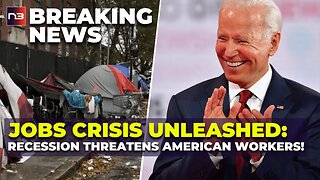 1:16
1:16
NextNewsNetwork
1 year agoImpending Economic Apocalypse: Job Report Sounds Recession Alarm Bells!
208 -
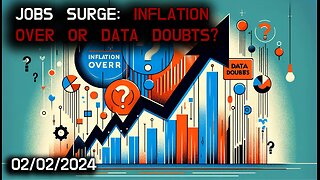 41:19
41:19
Patriot Radio News Hour
4 months ago📊📈 Jobs Surge: True Indicator of Inflation's End or Misleading Data? 📈📊
11 -
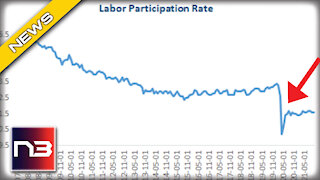 5:47
5:47
NextNewsNetwork
2 years agoBiden Releases New Jobs Report, There’s Just One Thing Wrong With It
2374 -
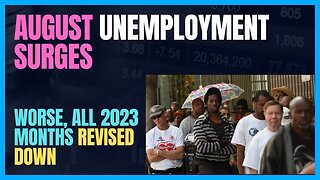 14:49
14:49
theroiist
9 months agoPLUNGED: UNEMPLOYMENT RATE DROPPING HARD; ALL 2023 JOB #'S REVISED
2 -
 7:14
7:14
NextNewsNetwork
1 year agoSecret Source of Biden's Record Workforce Rates Exposed: Uncover Startling Truth Behind Jobs Report!
57 -
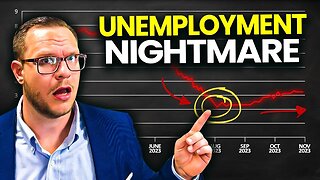 10:47
10:47
10 Minute Stock Trader
7 months agoAre Biden's Job Stats FAKE?
41 -
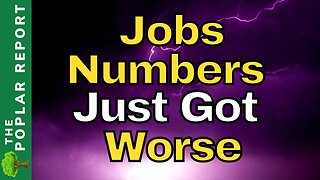 12:58
12:58
Poplar Preparedness
9 months agoThe WORST Jobs Report Since 2020
124 -
 0:16
0:16
Wealthion
1 year agoIs the Fed Lying About a Recession?
65 -
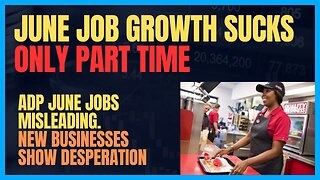 14:16
14:16
theroiist
11 months agoBAD JUNE JOBS DATA - ADP Jobs Report Looked Good; Under the Hood is JOB DESPERATION
1 -
 4:14
4:14
RT
3 years agoUS job report paints grim picture of slow economic return
32